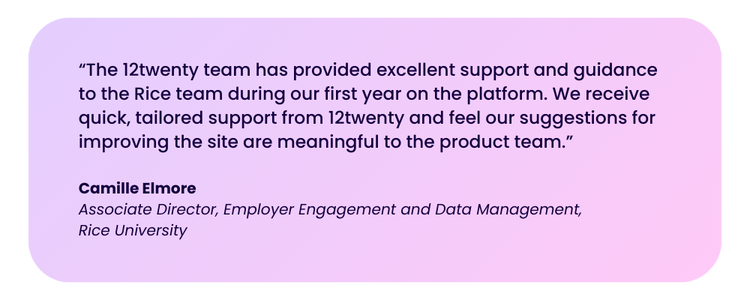Choosing the Right Career Management System: 12twenty vs. Symplicity




Dive into the key differences between two leading career management platforms. From customization to employer connections, find out which solution fits your institution’s needs and sets your students up for success.
Navigating the world of career management systems can feel overwhelming for universities eager to enhance their services. With so many options, how do you know which platform will best serve your institution and its students? Enter Symplicity and 12twenty—two leading solutions that offer unique features and capabilities. In this comparison, we’ll unpack what sets them apart, ensuring you have the insights needed to make an informed decision that drives your career services forward.
Customization Options
12twenty shines with its extensive customization capabilities, allowing career centers to tailor various aspects of the platform, from student profiles to branding elements. This level of configurability enables institutions to create user experiences that resonate with their unique campus culture and student demographics. A platform that reflects an institution’s identity fosters greater engagement, leading to higher participation rates in career services.
Symplicity also provides customization options but operates within a more structured framework. While users can adapt the platform to their needs, they may encounter limitations that hinder their ability to implement desired changes quickly.
Data Integration and Insights
In today’s data-driven environment, access to relevant insights is crucial. 12twenty offers integrated analytics that provide real-time data across all modules. This seamless access allows career advisors to quickly view important metrics, enabling them to respond effectively to trends and adjust strategies. With timely insights, career centers can better align their services with student needs, enhancing overall career readiness.
On the flip side, Symplicity provides reporting tools that help users gather insights. However, navigating these tools can sometimes be cumbersome, requiring additional effort to extract actionable data. This complexity may slow down the decision-making process, affecting a career center’s ability to respond proactively.
Networking and Employer Connections
12twenty emphasizes a curated network of over 250,000 employers, focusing on building lasting relationships that lead to relevant job opportunities. This commitment to quality ensures students have access to meaningful prospects aligned with their career goals, significantly improving their chances of securing desirable positions.
Symplicity, while offering a broad volume of job postings, may encounter challenges with the quality of employer connections. Users often report variability in the relevance and currency of listings. Outdated postings can frustrate students and undermine the effectiveness of the platform, highlighting the importance of maintaining a strong network.

Customer Support and Responsiveness
Customer support is vital for any software platform, especially in fast-paced career centers. 12twenty is known for its exceptional service, providing dedicated support that feels personalized. Institutions benefit from timely assistance, ensuring they can maximize the platform’s potential and minimize disruptions to their operations.
While Symplicity also offers solid support resources, feedback indicates that response times can be inconsistent. This variability can pose challenges for institutions requiring immediate assistance, particularly during peak usage periods when timely support is crucial.
Conclusion: Choosing the Right Partner for Your Career Services
Both Symplicity and 12twenty provide valuable career management solutions, each with its strengths and areas for improvement. 12twenty’s focus on customization, integrated analytics, and strong employer connections makes it a compelling choice for universities aiming to enhance their career services. Meanwhile, Symplicity offers a reliable alternative with its extensive job postings and support resources, appealing to institutions with different operational styles.
Understanding these distinctions allows career centers to select the platform that best aligns with their specific goals and enhances the student experience. By considering factors such as customization, data access, employer engagement, and customer support, universities can make a choice that supports their mission of preparing students for successful careers.
To learn more about how 12twenty stands out against other platforms, read our comparison of 12twenty vs. Handshake for further insights.